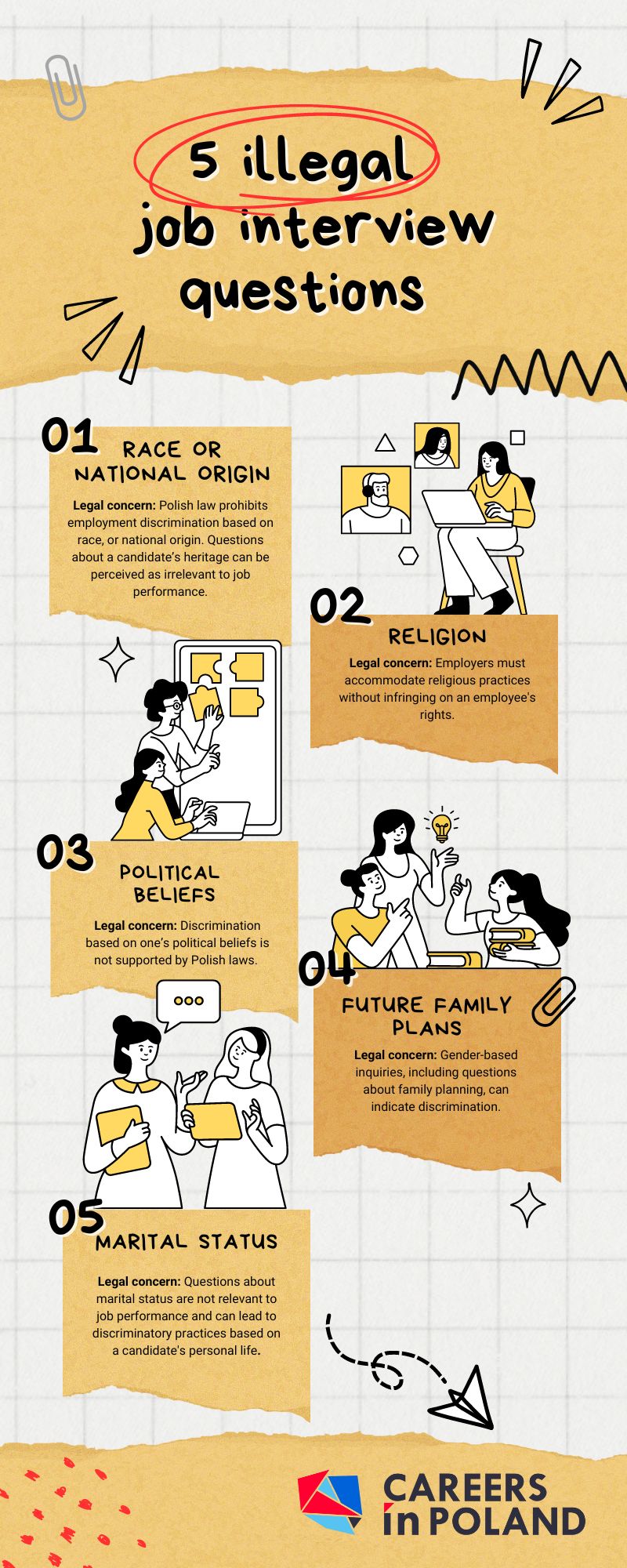5 illegal job interview questions – and 5 ways to counter them

Editor

related articles
related offers
What questions can employers legally ask during recruitment?
Job interviews allow candidates and employers alike to assess mutual fit and potential for a fruitful professional relationship. To learn more about a potential hire, employers will have to ask some questions – and to a degree, they are allowed and even expected to do so.
What is more, this right is even codified in the Polish law. The provision of Article 221 § 1 of the Labor Code precisely defines the scope of questions that can be asked of job candidates by an employer.
A candidate is of course allowed not to answer those questions. However, more likely than not such refusal will result in the exclusion from the recruitment process.
Employers in Poland are entitled to inquire about our:
- Name and surname,
- contact information,
- date of birth,
- place of residence,
- PESEL number (for tax purposes),
- education,
- professional qualifications,
- previous professional experience.
What are illegal job interview questions?
However, the line between a thorough vetting, and asking intrusive and illegal questions, is thin.
In layman's terms, illegal interview questions pertain to inquiries that violate anti-discrimination laws. These questions usually delve into personal information irrelevant to our ability to perform the job. In Poland, various laws protect candidates from such discriminatory practices, and the judgments of the Supreme Administrative Court, including the judgment of the Supreme Administrative Court of December 1, 2009. I OSK 249/09 and the judgment of the Supreme Administrative Court of September 6, 2011. I OSK 1476/10.
The questions that should be considered illegal at a recruitment interview involve religion, political views, state of health, addictions, family status, and personal plans. What is more, they shouldn’t in any way violate the dignity of the candidate.
ILLEGAL JOB INTERVIEW QUESTIONS: Categories and examples

1. Race or national origin:
- Example: “What is your ethnicity?”
- Legal concern: Polish law prohibits employment discrimination based on race, or national origin. Questions about a candidate’s heritage can be perceived as discriminatory and irrelevant to job performance.
2. Religion
- Example: “What religion do you practice?”
- Legal concern: Questions about religious beliefs can lead to discrimination, violating Polish regulations. Employers must accommodate religious practices without infringing on an employee's rights.
3. Political beliefs
- Example: “Do you support the current ruling political party?”
- Legal concern: Discrimination based on one’s political beliefs is not supported by Polish laws.
4. Future life plans (family)
- Example: “Do you plan to have children?”
- Legal concern: Gender-based inquiries, including questions about family planning, can indicate discrimination.
5. Marital status
- Example: “Are you married?”
- Legal concern: Questions about marital status are not relevant to job performance and can lead to discriminatory practices based on a candidate's personal life.
“Let me rephrase that…”
However, there are still ways for employers to circumvent the problem. They can gather the necessary information without crossing legal lines by rephrasing questions to focus on job-related skills and qualifications.
- Instead of “How old are you?”, ask: “Are you over 18?”
- Instead of “What is your nationality?”, ask: “Are you authorized to work in this country?”
- Instead of “Do you have children?”, ask: “Are you able to meet the work schedule requirements?”
“I’ve been asked an illegal question. What should I do?”
For candidates, handling illegal questions can be tricky. Here are some strategies you might want to consider:
1. Redirect
Politely steer the conversation back to job-related topics.
Example: “I’m confident my skills and experience make me a strong candidate for this role. Could you tell me more about the team I’d be working with?”
2. Deflect
Address the underlying concern without revealing personal information.
Example: “I am fully capable of performing all the duties required by this job.”
3. Clarify
Ask how the question relates to the job.
Example: “Can you explain how my marital status is relevant to my performance in this role?”
4. Refuse
Politely decline to answer.
Example: “I prefer to keep that information private, but I’m happy to discuss my qualifications for this position.”
5. Report
As a last resort, you can always report. If you believe the question was discriminatory, consider reporting it to the company’s HR department.












